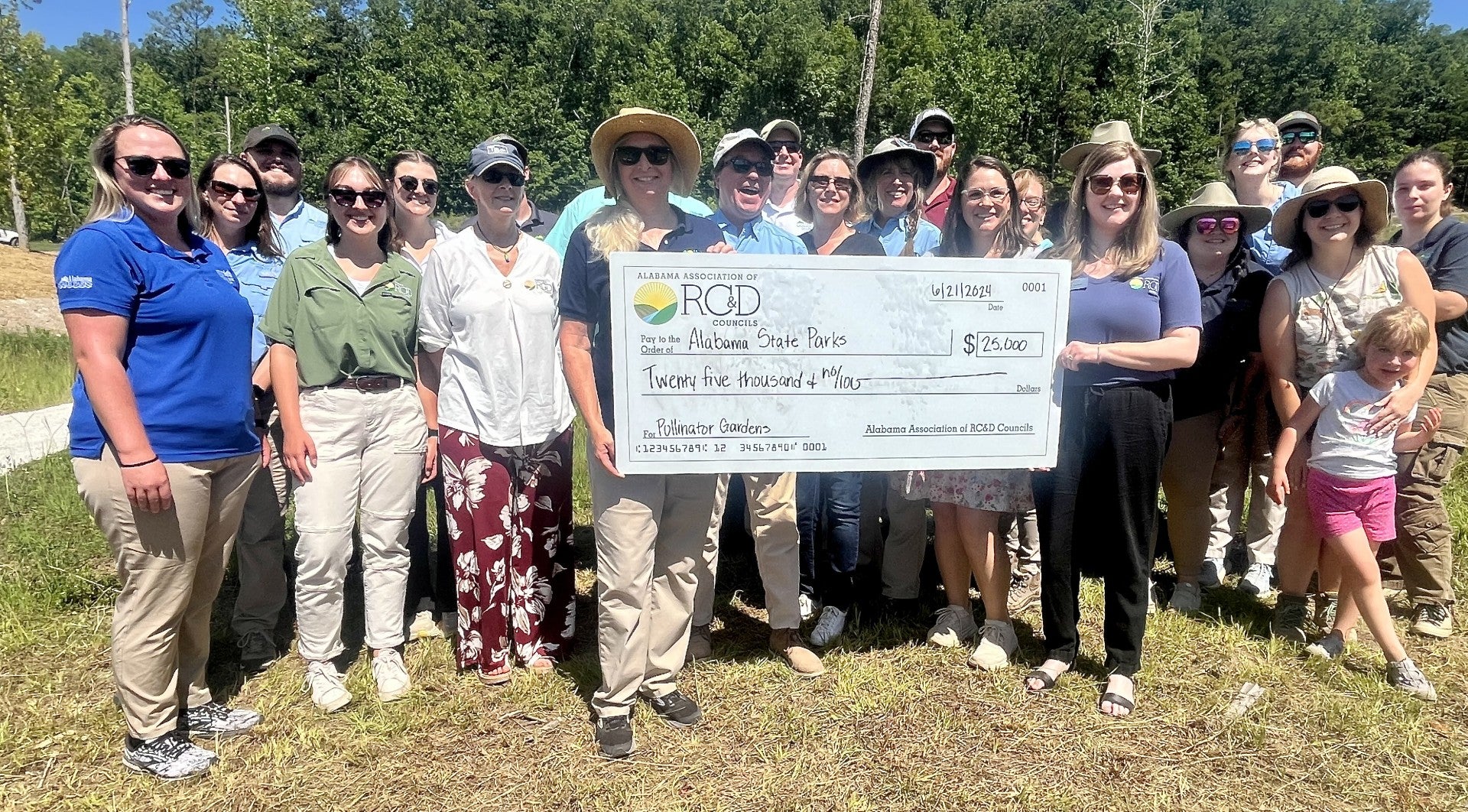The Alabama Association of Resource, Conservation and Development (RC&D) Councils presented a $25,000 grant to Alabama State Parks on Friday during the Pollinator Festival at Oak Mountain State Park (OMSP).
The RC&D grant will fund development of 12 pollinator gardens at state parks throughout the state.
“We truly appreciate RC&D for funding this project, which will create a new interactive experience for State Parks visitors to enjoy,” State Parks Director Greg Lein said. “These pollinator gardens are more than just something pretty to look at and enjoy. They also improve and enhance habitat for pollinators, and that has incredible ecological benefits for all Alabamians.”
The check presentation also included a surprise for Lein as officials dedicated the pollinator garden at OMSP in his honor in recognition of his visionary leadership and unwavering passion to preserve natural spaces. The festivities were part of the first Pollinator Festival at OMSP, which celebrates National Pollinator Week and debuts the first of the 12 pollinator gardens.
“This is an unexpected honor, and I’m greatly humbled by this recognition,” Lein said.
The pollinator gardens funded by the RC&D grant will be located in 12 Alabama State Parks:
- Oak Mountain State Park in Pelham
- Gulf State Park in Gulf Shores
- Wind Creek State Park in Alexander City
- Lakepoint State Park in Eufaula
- DeSoto State Park in Fort Payne
- Joe Wheeler State Park in Rogersville
- Lake Guntersville State Park in Guntersville
- Cheaha State Park in Delta
- Chewacla State Park in Auburn
- Roland Cooper State Park in Camden
- Meaher State Park in Spanish Fort
- Lake Lurleen State Park in Coker
Tasha Simon, Chief of the Natural Resources Section for Alabama State Parks, welcomed the opening of Oak Mountain’s pollinator garden. She shared the paced park-by-park schedule of pollinator garden installations will allow park guests to see all the gardens in full bloom by 2025.
Six of the 12 will include a story trail, which will be a children’s storybook experience within the pollinator garden. Oak Mountain State Park’s pollinator garden includes a story trail, as do the gardens at Gulf, Wind Creek, Lakepoint, DeSoto and Joe Wheeler State Parks.
Alabama State Parks Chief of Interpretation and Education Renee Raney also shared, “Each pollinator garden allows educators to utilize interactive learning tools through our on-site Teacher Toolkits. The kits paired with the pollinator garden trail experience provide opportunities beyond the park and into the classroom for students and educators.”
Bees, birds, moths, bats and other pollinators have been in decline in many parts of the country due to habitat fragmentation, pollution and invasive species. Pollinators need flowering plants and vegetation to live and forage for food, which the Alabama State Parks’ new pollinator gardens will supply.
“Healthy ecosystems depend on pollinators,” Simon said. “In fact, at least 75 percent of all the flowering plants on earth are pollinated by insects and animals. These plants stabilize our soils, clean our air, supply oxygen and support wildlife.”
At Oak Mountain, the pollinator garden was installed in an area that was devastated by a tornado in March 2021.
“It was the perfect place to create habitat for our pollinators,” Simon said.
Pollinators play a critical role in ecological balance, food production, biodiversity and environmental health.
“The new pollinator gardens are sure to become popular experiences at our State Parks. We again want to express our appreciation to RC&D for providing the funding,” Lein said. “We strive for every visitor to enjoy a first-class experience in our state parks, and these gardens definitely fulfill that goal.”
Park leaders welcome guests to stay, play, and explore naturally in all 21 Alabama State Parks by making reservations through the Plan Your Adventure Online portal at Alapark.com. Advance planning is encouraged to secure preferred dates.
About Alabama’s State Parks System
The Alabama State Parks is a division of the Alabama Department of Conservation and Natural Resources and maintains 21 state parks encompassing more than 50,000 acres of land and water in Alabama. The parks range from Gulf Coast beaches to Appalachian Mountains and provide opportunities and facilities from basic day-use activities to resort convention lodging, restaurants and golfing areas. These parks rely on visitor fees and the support of other partners like local communities to fund the majority of their operations. Learn more at www.alapark.com. Partners Pay the Way.
###






